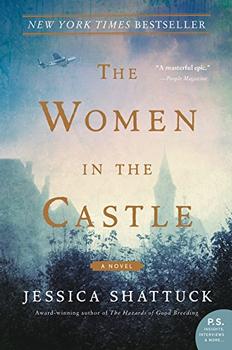Summary | Excerpt | Reading Guide | Discuss | Reviews | Beyond the Book | Readalikes | Genres & Themes | Author Bio

PROLOGUE
BURG LINGENFELS, NOVEMBER 9, 1938
The day of the countess's famous harvest party began with a driving rain that hammered down on all the ancient von Lingenfels castle's sore spots—springing leaks, dampening floors, and turning its yellow façade a slick, beetle-like black. In the courtyard, the paper lanterns and carefully strung garlands of wheat drooped and collapsed.
Marianne von Lingenfels, niece-in-law of the countess, labored joylessly to prepare for their guests. It was too late to call off the party. Now that the countess was wheelchair- bound, Marianne had become the de facto hostess; a hostess who should have listened to her husband and canceled the party last week. In Paris, Ernst vom Rath lay in a hospital bed, the victim of an attempted assassination, and in Munich the Nazis were whipping the country into a frenzy for revenge. Never mind that prior to the event no one had even heard of vom Rath—an obscure, midlevel German diplomat—and that his assassin was a boy of seventeen, or that the shooting was itself an act of revenge: the assassin's family was among the thousands of Jews huddled at the Polish border, expelled from Germany, barred entry by Poland. The Nazis were not deterred by complex facts.All the more cause to gather reasonable people here at the castle, away from the madness!Marianne had argued just yesterday. Today, in the rain, her argument seemed trite.
And now it was too late. So Marianne supervised the placement of candles, flowers, and table linens and managed the soggy uphill transport of champagne, ice and butter, potted fish and smoked meats, potable water and canisters of gas for the cookstove. Burg Lingenfels was uninhabited for most of the year, with no running water and a generator just strong enough to power the countess's Victrola and a few strings of expensive electric lights. Hosting the party was like setting up a civilization on the moon. But this was part of what kept people coming back despite yearly disasters—minor fires and collapsed outhouses, fancy touring cars stuck in the mud, mice in the overnight-guest beds. The party had become famous for its anarchic, un-German atmosphere. It was known as an outpost of liberal, bohemian culture in the heart of the proper aristocracy.
By midafternoon, to Marianne's relief, the wind began to blow, chasing away the day's gloom with gusts of clear and promising air. Even the stone walls and the moat's sinewy water looked fresh and clean scrubbed. The mums in the courtyard glistened under racing patches of sun.
Marianne's spirits rose. In front of the bakehouse, an architect acquaintance of the countess's had transformed an old carriage horses' drinking trough into a fountain. The effect was at once magical and comic. The castle was an elephant dressed to look like a fairy.
"Albrecht," Marianne called as she entered the long, low library, where her husband was seated at the imposing desk that had once been the count's. "You must come and see—it's like a carnival!"
Albrecht looked up at her, still composing a sentence in his head. He was a tall, craggy-faced man with a high forehead and unruly eyebrows that often gave him the appearance of frowning when he was not.
"Only for a moment, before everyone gets here." She held out her hand. "Come. The fresh air will clear your head."
"No, no, not yet," he said, waving her off and returning his attention to the letter he was writing.
Oh, come on, Marianne would have normally chided, but tonight, on account of the party, she bit her tongue. Albrecht was a perfectionist and workaholic. She would never change this. He was drafting a letter to an old law school acquaintance in the British Foreign Office and had sought her opinion on alternate sentence constructions many times. The annexation of the Sudetenland will only be the beginning. I urge you to beware of our leadership's aggression versus If we are not vigilant, our leader's aggressive intentions will only be the beginning . . .
Excerpted from The Women in the Castle by Jessica Shattuck. Copyright © 2017 by Jessica Shattuck. Excerpted by permission of William Morrow. All rights reserved. No part of this excerpt may be reproduced or reprinted without permission in writing from the publisher.




Analyzing humor is like dissecting a frog. Few people are interested and the frog dies of it.
Click Here to find out who said this, as well as discovering other famous literary quotes!
Your guide toexceptional books
BookBrowse seeks out and recommends the best in contemporary fiction and nonfiction—books that not only engage and entertain but also deepen our understanding of ourselves and the world around us.